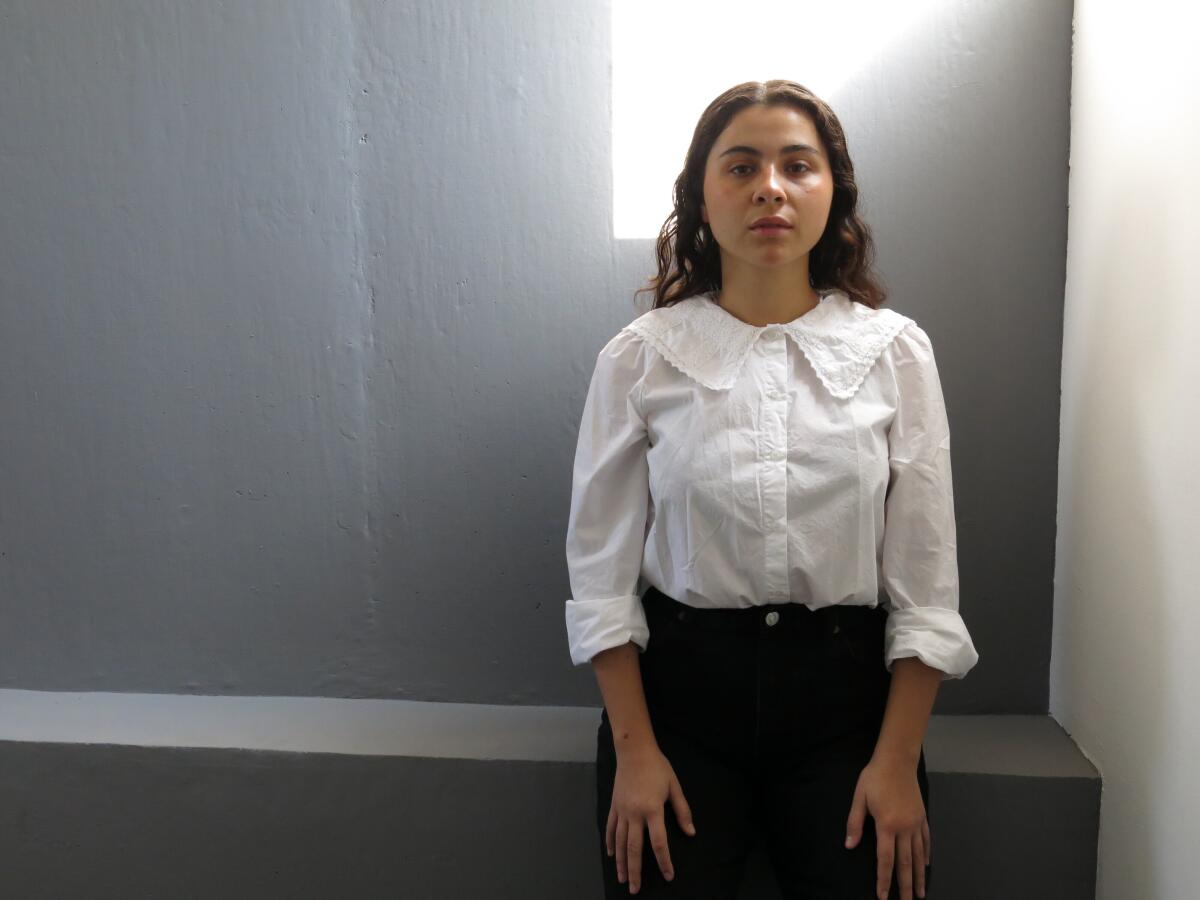Mexican singer-songwriter Silvana Estrada on finding the beauty in heartbreak

- Share via
Eight days into her first-ever U.S. headlining tour, Mexican indie artist Silvana Estrada was trapped in by ice.
A monster snowstorm that spanned 2,000 miles had reached Austin, Texas, where Estrada, 24, was forced to postpone a concert for safety concerns.
“Do I just have bad luck? Sometimes I have to ask,” she wonders over the phone. “It’s sad to tell people to stay home, but when things like this happen, I see an opportunity for us to rest and reflect.”
Today, though, Estrada is well outside Texas and basking in the sunshine of Los Angeles, where she’ll play a sold-out show at the Paramount Ballroom, featuring songs from her debut album, “Marchita.”
Tinged with elements of jazz, chamber pop and Mexican folk, “Marchita” — the Spanish word for “withered” — is a sublime meditation on heartache in all its gradations, limning the disintegration of her first romance when she was 19.
“Everything I learned about love before was super romanticized and so full of unnatural things,” she says. “People speak about love through morality, rules, ethics. Artificial symbols without emotion. I learned how to speak more about love in poetry than in symbols; in poetry, I could speak my feelings with freedom, and with freedom, I found beauty in the experience.”

Estrada, who lives part time in Mexico City, was born to two orchestra musicians in Xalapa, the capital city of Veracruz. They ended up running a string-instrument atelier out of their home in the small mountain town of Coatepec, where she recalls many an artist passed through.
“It was super cool,” she says. “But I just wanted to rebel.”
As a child, she gave up viola lessons in favor of piano; at 12, she insisted on becoming a professional volleyball player — “I was so bad,” she says — then at 14, she studied psychology.
Estrada was 16 when she was accepted into the university jazz program in Xalapa; consequently, she accepted that music was simply her fate.
“We all have our little rebellions,” she says. “But as I got older, it became less about being contrarian and more about indulging my curiosities.”
Although Estrada plays a multitude of instruments, she’s most fond of her Venezuelan cuatro, a compact, four-string descendant of the Spanish Renaissance-era guitar. Her technique stems from the art of Mexican son jarocho, a folkloric style of music native to Veracruz, hallmarked by the concurrent strumming of such string instruments as harps and guitars. (The most popular son jarocho song in history? Ritchie Valens’ rock ‘n’ roll hit from 1958, “La Bamba.”)
“When I think of son jarocho, I think of community,” she says. “We share songs about the land, about family, about sadness. We sing about the things we share with other people. It’s the same thing that drew me to jazz — sharing space with others for your feelings, for expression.”
In 2016, at the age of 19, she took a life-changing trip to New York City to riff with jazz guitarist Charlie Hunter, noted collaborator of Frank Ocean, D’Angelo and Norah Jones. Their sessions eventually became a 2017 Latin jazz fusion album, “Lo Sagrado.” The following year, Estrada released a four-song solo EP titled “Primeras Canciones.”
She went on to perform sold-out shows in Mexico, where she collaborated with influential artists like Natalia Lafourcade and Julieta Venegas. Estrada landed back in New York in February of 2020, when she signed a deal with Glassnote Records, with the promise of a polished debut to be released before year’s end.
The pandemic set back the release cycle by two years.
“Most of these songs on ‘Marchita’ were written four or five years ago,” says Estrada. “It can be weird to sing about heartbreak from so long ago, but by singing it on this tour, it actually feels I’m celebrating all I’ve learned.”

Apart from the delicate strum of the cuatro, a procession of percussive stomps or the occasional, cathartic sighing of a string quartet, “Marchita” is spare in its instrumentation — which, in turn, fortifies even the slightest inflection in Estrada’s voice. Sung in Spanish, her verses rise and bloom like wildflowers, sprawling across the otherwise sober ambiance.
“We decided that playing with a full band or an orchestra would be too much information,” says Estrada, who recorded under the guidance of producer Gustavo Guerrero, guitarist in Lafourcade’s band.
“[Guerrero] thought I needed to give my words more air,” says Estrada. “Like in my song ‘Casa,’ I sing about my parents getting older, and what they will leave behind ... and the strings express those feelings, too, but in their own language. Sometimes a sound is just noise, but sometimes, like when you hear a door slam, you understand its meaning without words. We give the other space to speak.”
Now that she’s safely on the other side of it — what is the silver lining to the heartbreak she sings of?
“If anything, I realized how much I need to fight for my happiness,” she says. “In love, in life, in this capitalist world we live in. You have to defend your happiness. That’s the only way you’re gonna make it.”
More to Read
The biggest entertainment stories
Get our big stories about Hollywood, film, television, music, arts, culture and more right in your inbox as soon as they publish.
You may occasionally receive promotional content from the Los Angeles Times.












